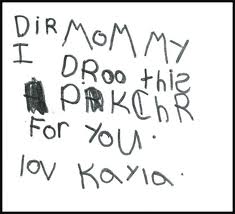We come now to the time of year I think of as “contest time,” meaning the time of year when chapters of Romance Writers of America are holding writing contests for aspiring authors. Some of these competitions are fierce, with as many as 300 entries in a single category, and all of them take tremendous effort to coordinate.
 I am published in part because of these chapter contests, for two reasons. First, when my prospective editor asked, ‘What ammunition can you give me to set you apart from all the other unpublished Regency authors?’ I could point to a fistful of contest wins and finals. I had no idea they were significant, but they got me the all important boost out of the slush pile.
I am published in part because of these chapter contests, for two reasons. First, when my prospective editor asked, ‘What ammunition can you give me to set you apart from all the other unpublished Regency authors?’ I could point to a fistful of contest wins and finals. I had no idea they were significant, but they got me the all important boost out of the slush pile.
Second, many contests are judged by published authors, and friends and neighbors, I am telling you, when a published author sets out to ‘splain what you’re doing wrong, she’s usually accurate, articulate, and ferociously determined to get her message across.
 I got comments along the lines of, “I’m being so hard on you because I believe in your voice.” That after, three pages of solid, relentless critique. Another author told me I was going to end up in the missed-it-by-that-much category if I didn’t tend to the things she pointed out, and that would be TRAGIC, given the potential in my writing.
I got comments along the lines of, “I’m being so hard on you because I believe in your voice.” That after, three pages of solid, relentless critique. Another author told me I was going to end up in the missed-it-by-that-much category if I didn’t tend to the things she pointed out, and that would be TRAGIC, given the potential in my writing.
Yikes! I paid attention. I buffed the goods and now it’s my turn to judge a few contests.
I enjoy it. I enjoy seeing the wonderful creativity awaiting publication, I enjoy knowing I might be able to sand off a few rough edges on somebody’s writing, and give them the boost so generously given to me. The world can never have enough well written love stories, after all.
And that would be motivation enough to accept the judging packet, but a funny thing happens when I get into judging mode: My writing improves.
When I’m beavering away at a Work In Progress, I’m usually struggling to get the story on the page, struggling to figure out what the story is, so I can get it on the page. I lose sight of the old chestnuts:
1) Avoid starting a sentence with ‘there are,’ or ‘it is’
2) Cut the words, ‘just,’ ‘very,’ and ‘that’ whenever you can
3) Establish the setting with sensory details that are either symbolic or have significance to the Point of View character only
 The list of shoulds and oughts is long, and as Voltaire observed, when it comes to writing, the list cannot be learned quickly no matter how talented or dedicated the student. I’m reminded though, of the efficacy of the one room school house approach to education.
The list of shoulds and oughts is long, and as Voltaire observed, when it comes to writing, the list cannot be learned quickly no matter how talented or dedicated the student. I’m reminded though, of the efficacy of the one room school house approach to education.
Once upon a time, somebody took a bunch of students from a public school setting, and instead of having each grade taught by a separate teacher, they went back to the older method, of having the students in each grade teach the students below them in one-to-one or nearly one-to-one sessions. The result was an improvement in everybody’s performance, and with much less effort on the teacher’s part (though I assume the process took more time, at least).
So I get to help out some aspiring writers, but I benefit as much as anybody else. Pretty cool.
Has a generous impulse ever yielded an unexpected bonus for you? To one commenter, I’ll send a signed copy of “Lady Louisa’s Christmas Knight,” or, if you’re an aspiring author, I’ll critique three scenes of your fiction writing–let me know in the comments if that’s your preference.







Hi, Grace:
When I was in grad school, both teaching freshmen first year writing and working my dissertation at the same time, I definitely found critiquing my students’ writing helped me to improve my own. So much of how we write has been internalized, and is done without thinking about the whys and wherefores. But when you have to call beginning writers’ attention to the “rules,” it makes you stop and consider your own process.
Would be overjoyed to receive a critique from you; a friend just won one from you at an RWA conference and said you helped her see things she had no idea she was doing wrong…
Jackie, you point out an important part of the grad school schlep many people overlook. Those TA positions buff our knowledge of the field, and give us more insight into what the profs have to deal with on their way to an academic career.
Will put your name in the hopper for the critique.
I am one of those people who can’t help helping. I always feel the wish to do so when someone is in need (or not even that…). And just seeing that I helped someone makes me happy, to have done something good. Sounds really boring and self-praising but is just true.
And I used to teach students at university (engineering), and to me the bonus is when you just see or realise that they got it, that they learned something or that they are happy to have understood what I wanted them to learn and understand. And as you experienced, too, you usually learn something yourself, as I had to prepare for the lessons or got asked things I had not thought of before and had to stay up-to-date.
I can’t really think of a certain bonus-example right now, but I think the general benefit I described will do.
My brother tells the tale of some famous lecturer holding forth as a guest at an Ivy League institution on digestive physiology. Some freshman raised a hand, and asked one of THOSE questions, pointing out a detail that suggested carbohydrate metabolism couldn’t possible work the way this guy had theorized, because of some commonly observed metabolite nobody ever thought had any significance.
That question launched the entire concept of glycemic value, and changed how we think of the relationship between blood sugar and food type.
How many other people had scratched their heads over the same anomalous data, and been too timid to raise their hands?
Teaching, critiquing, reviewing – we learn so much more than we plan or understand when we share knowledge with others. I love teaching, and I love learning more about what I thought I knew when I interact with my students, whether it is a Sunday School lesson, a review of a portfolio for a student teacher, or learning about the infant view of life from my granddaughter.
I continue to love what you write, and the way you write it. Thanks for paying attention, and ‘buffing the goods’ and becoming a published writer. I think this last story, of Joseph and Louisa, is one of my favorites (to date).
My cousin is an aspiring writer, and I will direct him to this page, as I direct him to any pages that talk about the art and science of the written word.
Polly, I’m told many people who write something other than romance–thrillers, mystery, literary fiction, Young Adult, etc–join RWA because the organization is so determined to educate its members regarding the craft of writing, and the business of writing as well.
If your nephew has questions, he can email me through my website or at [email protected].
I have been reading since I was 4 years old. My mother says I took to reading like a foal to standing. Reading was a refuge during my childhood in my turbulent family situation. I still read constantly, always have at least 1 book going and piles TBR. I tried my hand at writing as a teen but never believed in myself enough to finish anything. I married and became a mother at 19 and now have 4 boys 6-14. I wouldn’t change that for anything. However, if I could change anything it would be to go to have gone to college during their early years. I have recently started writing again at the emphatic encouragement of my husband and oldest son. I always doubt that what I am writing is good because I never took any writing classes, ever. But that hasn’t stopped me from writing. I am reading differently now, looking at how it is written not just what is written. My 2 best friends have become my proofreader/editors and I theirs. It has encouraged all of us tremendously!
Hoo-boy! That’s how it starts, Kylan… you dabble, you dabble some more, and then you realize you’ve read THOUSANDS of books, good, bad, and wonderful, and you DO SO know a thing or two about writing one.
You get some craft books, (Stephen King on writing seems to appeal to a lot of people), you dip your toes in a few workshops, and pretty soon, you have a manuscript that’s coming along more quickly than you thought it could… Best, best, best of luck, and heed Agatha Christie’s words:
Write even when you don’t want to, don’t much like what you are writing, and aren’t writing particularly well.
I keep that one by my computer.
I always think of putting my story ideas to use. My family encourages me to try writing my own book, as I am a voracious reader. I tell them not all who read can write, but maybe one day I will get the nerve to do it. I enjoy hearing about how to get things critiqued, I did not realize there were contests. All this information is useful for when I finally put pen to paper. I really enjoyed “The Heir” and I would love to win a copy of your book “Lady Louisa’s Christmas Knight.”
Ann, glad you enjoyed Westhaven’s story, but there is no reason on this great, wonderful, beautiful earth why you should not try your own hand at story craft. Even if your goal is not publication, creative self-expression is not just good for the soul, it’s vital–says me.
Teaching two twenty-something young men how to cook forced me to improve my communication skills, to remember the reasons behind my kitchen habits. Understanding the “why” of a task seemed to make the concept stick better in their minds, made them much more willing kitchen minions, and not resent being instructed to do a task ‘just so.’ With their encouragement my new challenge is to communicate those skills and recipes via a blog.
You going to lay a link on us, Chef?
http://kitchenwitchofthewest.blogspot.com
previous posts for pumpkin tomato soup, midnight brownies, and the blondies (addictive things those blondies) are back in season. The Savoy scones are *always* good with a book and a cuppa!
I’ve been asked to edit a few some school assignments for friends. It’s interesting to show someone how to shape a term paper and strengthen the narrative. It also gives me a chance to refresh my memory on different subject matter. I only wish my talent extended to fictional material. I’d like to win a copy of your book.
Kim, when I’m writing fiction, it’s real to me. Yeah, I know… it’s make believe, but you can’t treat it as make believe when you’re in the middle of it, or it will read as make believe…
And yet, some of the term papers I wrote? Whew! Talk about your cre-a-tive writing!
You people are amazing. It hurt my feelings just reading this. haha No way could I do it. But I am so glad for the wonderful writers that do.
Lisa, there’s a rite of passage all published authors go through. We get some snarky, nasty reviews, we go into a tail spin… some editor or writing buddy directs us to the Amazon pages for our keeper authors, and we read all the many, many more snarky, nasty things people wrote about their books.
This is supposed to cheer us up. Hmm.
Grace,
Last summer (2011), I discovered British supermodel David Gandy on an HR blog. I found his personal Facebook profile in August. It didn’t take long to become disappointed at the small number of pictures he posted there. On a whim, I sent him a message in which I asked if I could post some newly-released pictures from a recent fashion editorial. To my complete surprise, David responded to my message! He thanked me for the generous offer and said that he would use a couple of the pictures I sent to him. That was October, 2011–exactly a year ago. By Christmas, I was also sending David links to blogs, interviews and articles–some of which he would “share” on his profile.
In April 2012, I created an official FB page for him and we launched it at the end of that month. In May, I asked if I could launch an official DG Tumblr and last month, we launched his official Twitter. Today, his official FB has 8,400 followers, his one-month old official Twitter has 3,200 followers and I am his acknowledged Social Media Assistant.
Best of all, I have developed a true friendship with this awesome, interesting, gorgeous man. I get to chat with the real David Gandy almost every day–sometimes several times a day. He trusts me–personally and professionally–and recently described me as “the most selfless person” he has ever known. It’s probably the nicest thing someone has ever said to me.
I can’t wait for all the exciting things that are in the works for David in the very near future. Occasionally, I pinch myself–just to be reminded this relationship is real. And, it never would have happened if I hadn’t taken the initiative to offer my assistance.
Gadzooks! THAT is a tale of generosity rewarded! We think of beautiful people as somehow more complete and competent than we are, and yet, David Gandy didn’t have an official FB page?! Clearly, he was a man in need.
And how many people browsed the same page you did, and had the same thought you did–“Wonder why so few pics when it’s his stock in trade?”–and yet they did not take that extra step to reach out and risk rejection.
Might have to go like me a FB page.
WELL DONE, YOU. (And you might suggest to Himself that you know a few romance novels in need of some tall, dark, and handsome…. just sayin’…)
Grace,
I’ve loved all of your books, so far, and am really looking forward to your (apparently!) prolific future. I discovered the same benefits to sharing with others when, in a junior high biology class, I helped a classmate understand whatever it was we were studying at the time.
Those biology classes… my brother has been married for the past 25+ years to his high school biology lab partner. Maybe they shared an interest in wild life?
Grace,
I have not studied at university for many years but the one course I needed were I to go back in time & change the degree-technical writing. I believe too much emphasis had been placed on generic composition. I discovered my writing skills above most-granted I was not writing novels. My grammar exceeded the “grownups” upon graduation thankfully my Little Brown Handbook of Grammar proved my point changing written policy… How dare a science geek challenge older people? Still, technical writing need not be compound complex sentences full of 6 syllable words… I find it the most difficult type due to my audience. I appreciate losing myself, if only for a few hours, in another time using my imagination soaking up the words.
Ann, my very first job description was “tech writer.” I’d bounced out of college on down to Washington, DC, because I was told, “anybody can get a job there.” I ended up working for companies who wrote documentation for the federal government’s many, many computer systems… ARGH. I do not have the gene for that, but it got my feet wet in the document production end of things, and showed me I could deal well with deadlines.
Silver linings, those, but real benefits.